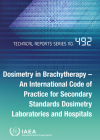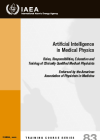Quality assurance consists of structured procedures and actions aimed at maintaining a high level of quality diagnosis or treatment of patients. Increasing complexity of medical technology requires specialized and systematic verifications to ensure quality and effectiveness and avoid accidents.
Quality assurance in radiation
Diagnostic imaging
Nuclear medicine and diagnostic radiology provide crucial information for an accurate diagnosis of patients. To ensure adequate diagnostic information can be delivered while radiation exposure of patients is minimized, quality assurance covers infrastructures, human resources and procedures.
Radiation treatment
The precision and accuracy of radiotherapeutic or metabolic treatments are essential for them to be efficient. Many parameters affect the outcome of radiation treatment. Structured quality assurance procedures may help minimize side-effects for patients, while optimizing treatment delivery.
Education and training
To achieve and maintain a high level of quality and effectiveness in diagnostic imaging and radiation treatment, education and training are crucial. Clinically qualified medical physicists and radiological medical practitioners are the experts that are responsible for applying quality assurance procedures in the clinical environment.
Research and development
International collaboration among scientists through coordinated research projects helps countries to be involved in the development and testing of new quality assurance procedures. The IAEA facilitates such initiatives and ensures that the research results are freely available to all Member States.








